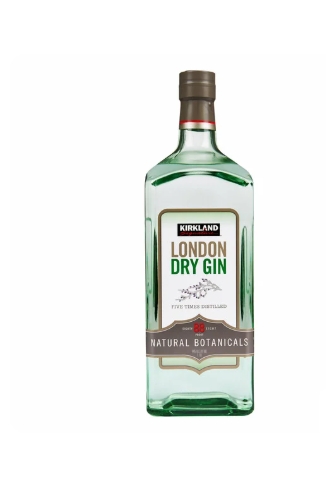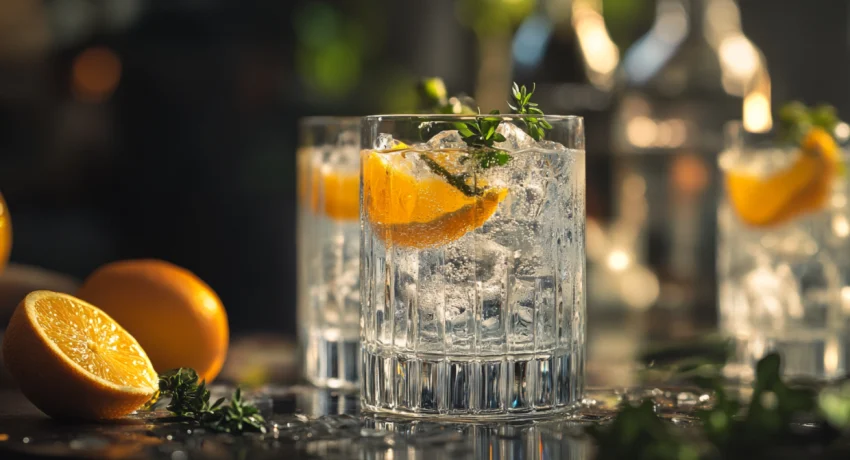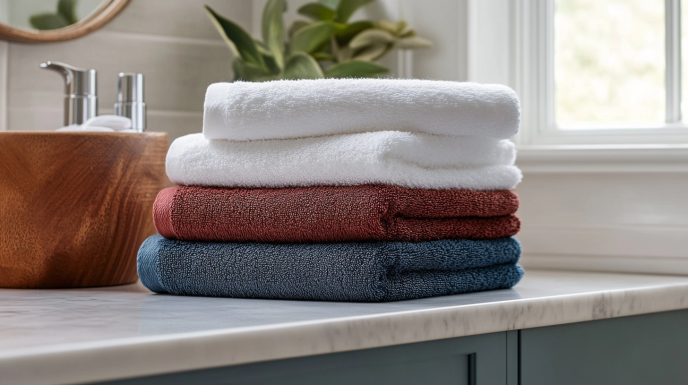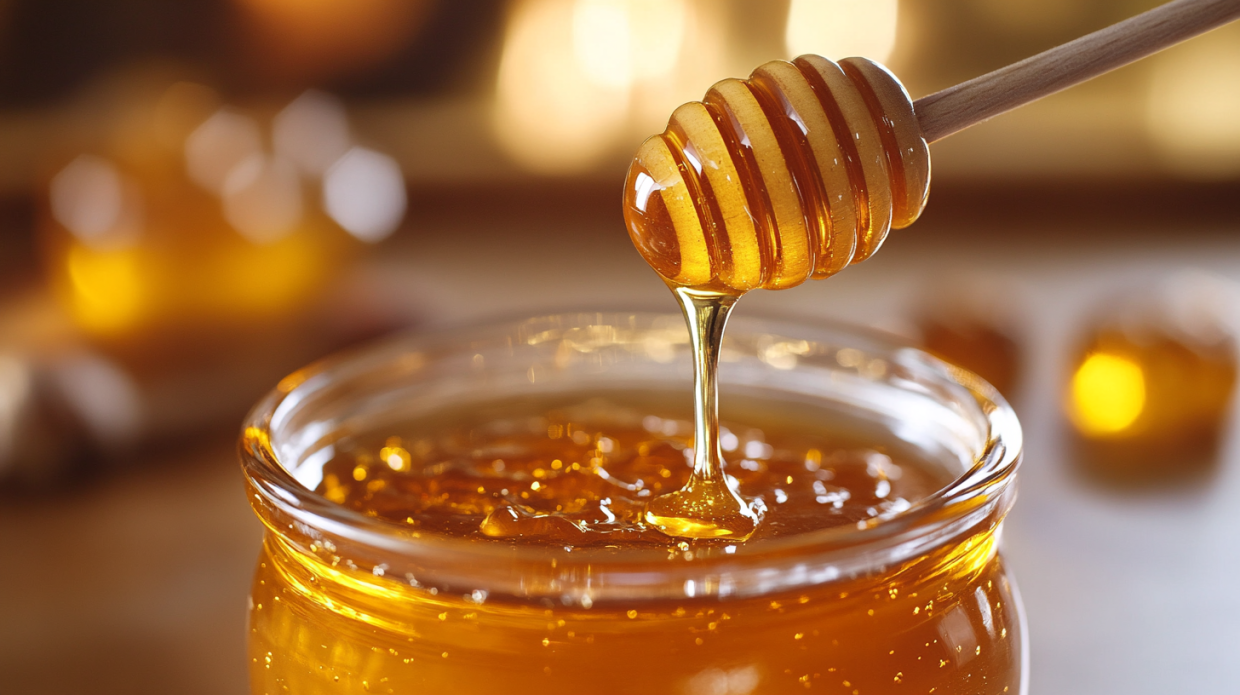
Kirkland Signature London Dry Gin, 1.75 L
- 44% alcohol by volume.
Uncovering Costco’s Premium Spirit That Won’t Break the Bank
When it comes to spirits, many of us have been conditioned to believe that quality comes with a hefty price tag. We reach for the familiar brands positioned at eye level, their marketing budgets reflected in both their premium shelf space and their premium pricing. But what if I told you that one of the best gin values on the market today is hiding in plain sight, wearing an unassuming label in the warehouse aisles of your local Costco?
I still remember my first encounter with Kirkland Signature London Dry Gin. Standing in Costco’s liquor section, debating between my usual Bombay Sapphire and a bottle of Tanqueray, my eyes wandered to that distinctive Kirkland label. At nearly half the price of the brands I typically purchased, skepticism was my first reaction. But curiosity (and my wallet) encouraged me to take the plunge. That decision has forever changed my home bar setup, and today I’m going to share why Kirkland Signature Gin represents one of the best quality-to-price ratios in the spirits world.
Over the next few minutes, I’ll guide you through everything you need to know about this understated spirit—from its origins and production to taste profile, cocktail versatility, and why it’s developed such a devoted following among both casual gin drinkers and aficionados alike.
The Essentials: What Is Kirkland Gin?
Kirkland Signature London Dry Gin is Costco’s private label gin offering. For those unfamiliar with Costco’s business model, their Kirkland Signature line represents their in-house brand, which they develop in partnership with established manufacturers to deliver quality products at competitive prices by cutting out marketing costs and leveraging their massive purchasing power.
The gin itself is a classic London Dry style, bottled at 44% alcohol by volume (88 proof)—slightly stronger than the standard 40% ABV found in many competitors. This higher proof provides a robust foundation for cocktails, allowing the gin to stand up admirably when mixed with tonic, vermouth, or other ingredients.
What makes this gin particularly interesting is its origin story. While Costco maintains some secrecy around their manufacturing partners (a common practice in private label arrangements), industry insiders and spirits experts widely believe that Kirkland Signature Gin is produced by the same distillery that makes Bombay Sapphire. Some even suggest it might be essentially the same product with different botanicals and branding.
The Price Point: Exceptional Value
Let’s address the elephant in the room—price. As of my last visit to Costco, a 1.75-liter bottle of Kirkland Signature Gin was priced at approximately $25.99. To put this in perspective, a similarly sized bottle of Bombay Sapphire typically sells for around $45-50, while Tanqueray runs about $35-40 for the same volume.
This pricing isn’t just competitive—it’s downright disruptive. We’re talking about paying approximately $14.85 per liter for a premium London Dry Gin. For comparison, most well-regarded gins in the market come in at $25-35 per liter. The value proposition becomes even clearer when you calculate the cost per drink, which works out to roughly $0.75 per standard 1.5-ounce pour—significantly less than you’d pay using mainstream premium brands.
The exceptional value becomes even more apparent when you consider that this isn’t merely a “budget” gin trying to compete with bargain brands. Rather, it’s positioned as a premium product at a non-premium price point.
Ingredients and Production: Traditional Methods, Quality Inputs
Like all proper London Dry Gins, Kirkland Signature starts with a neutral grain spirit base. While Costco doesn’t publish a comprehensive list of botanicals used in their gin, tasting notes and aroma analysis suggest the presence of traditional gin botanicals including:
- Juniper berries (the defining ingredient in any gin)
- Coriander seeds
- Angelica root
- Orris root
- Citrus peel (likely lemon and orange)
- Possibly cassia bark or cinnamon
- Licorice root
The production process adheres to the strict standards that define London Dry Gin, which requires that all flavors be introduced through distillation rather than added afterward. This means all botanicals are steeped in the spirit and then redistilled, creating a clean, pure expression of these classic gin flavors.
The botanicals are well-balanced, creating a harmonious flavor profile that neither over-emphasizes juniper (as some traditional gins do) nor relegates it to a background note (as with many modern “new western” style gins). The result is a versatile spirit that can satisfy both traditional gin enthusiasts and those who prefer a more balanced approach.
Flavor Profile: Approachable Yet Complex
Upon first sip, Kirkland Gin presents a classic London Dry profile with distinct juniper-forward character, though not as aggressively piney as some traditional offerings. The juniper is complemented by bright citrus notes and a subtle sweetness that rounds out what might otherwise be a sharp edge.
Mid-palate, you’ll detect warm spice notes and a hint of earthiness from the root botanicals. The finish is clean and relatively long for a gin in this price category, with a pleasant warmth from the higher proof but minimal burn.
What’s particularly impressive is the complexity you get for the price point. Many gins at this price level tend to be one-dimensional, but Kirkland offers layers of flavor that unfold as you sip. The mouthfeel is satisfyingly substantial—not thin or watery as budget spirits can sometimes be.
One of the most frequent comments from first-time tasters is how smooth the gin drinks despite its higher alcohol content. This smoothness makes it exceptionally versatile in cocktails and approachable even for those who claim they “don’t like gin.”
Cocktail Versatility: A Mixologist’s Friend
The true test of any gin comes in how it performs in various applications, from simple mixed drinks to complex cocktails. This is where Kirkland Gin truly shines. Its balanced profile and slightly higher proof make it an ideal foundation for virtually any gin-based cocktail.
In a classic Gin & Tonic, the juniper and citrus notes complement the quinine bitterness of tonic water perfectly, while the 44% ABV ensures the gin’s character isn’t lost among the mixer and ice. A simple garnish of lime or lemon brings everything together beautifully.
For Martini lovers, Kirkland’s clean profile works wonderfully with dry vermouth, creating a cocktail that’s neither too assertive nor too bland. The slightly higher proof helps it stand up to the vermouth without requiring an excessive pour of gin.
In more complex cocktails like the Negroni or Last Word, Kirkland Gin holds its own against strong companion ingredients like Campari or Green Chartreuse, providing a solid gin backbone without dominating the drink.
Even in delicate applications like the Gin Fizz or Aviation, where subtlety is key, this gin performs admirably, contributing character without overwhelming the other ingredients.
Accessibility: Where to Find It
The one potential drawback to Kirkland Signature Gin is its limited availability. As a Costco private label product, it’s sold exclusively at Costco warehouses, and only those with liquor departments. Due to varying state liquor laws, not all Costco locations sell spirits, so availability depends entirely on your location.
States with more restrictive alcohol laws often limit liquor sales to dedicated liquor stores or state-run establishments, meaning Costco cannot sell spirits in these locations. As of the last count, Costco sells liquor in approximately 31 states.
Even in states where Costco does sell spirits, you might encounter another obstacle: some locations require a Costco membership to purchase alcohol, while others do not. This varies based on state law—some states specifically prohibit membership requirements for alcohol purchases.
For those without convenient access to a Costco that sells spirits, this exclusivity might be the biggest drawback to adopting Kirkland Gin as your house pour. However, many enthusiasts find the savings substantial enough to justify an occasional special trip or even a Costco membership solely for access to their liquor department.
The Quality Question: How Does It Compare?
When discussing a value-priced spirit, the inevitable question arises: how does it actually compare to established premium brands? Is the savings worth any potential quality trade-off?
In blind tastings, Kirkland Gin routinely performs well against competitors at much higher price points. While it may not capture the distinctive character of a craft gin with exotic botanicals or the storied heritage of brands with centuries of history, it delivers a remarkably solid, versatile London Dry experience that satisfies both casual drinkers and aficionados.
When compared directly to Bombay Sapphire—which many believe shares production facilities—Kirkland offers a slightly more traditional, juniper-forward profile against Bombay’s more floral approach. Against Tanqueray, another common comparison point, Kirkland is generally considered somewhat softer and less aggressively juniper-driven.
The consensus among spirits writers and gin enthusiasts is that Kirkland Gin doesn’t merely compete with premium brands despite its price—it often outperforms many of them. This isn’t a case of “good enough for the price,” but rather “excellent regardless of price, and happens to be affordable.”
Beyond Price: Additional Considerations
Gluten Concerns
For those with gluten sensitivities, it’s worth noting that while gin is distilled from grains that contain gluten, the distillation process typically removes gluten proteins. Kirkland Gin, like most distilled spirits, is generally considered gluten-free, though Costco doesn’t specifically market it as such. Those with severe celiac disease or extreme gluten sensitivity should, as always, exercise caution.
Shelf Life and Storage
As with all spirits, Kirkland Gin has an indefinite shelf life when properly stored. Keep the bottle away from direct sunlight and extreme temperature fluctuations, and it will maintain its quality for years. Unlike wine, spirits don’t continue to age or develop in the bottle, so there’s no advantage to “cellaring” your gin.
The 1.75L bottle size is both a blessing and a potential challenge—while it offers exceptional value, those who drink gin infrequently might find the large format impractical. However, the stable nature of distilled spirits means you needn’t worry about the product degrading over time.
Seasonal Availability and Discounts
While Kirkland Gin is generally a year-round offering, Costco occasionally features temporary price reductions of $2-4 off the already competitive price. These discounts typically coincide with major holidays or seasonal promotions. The retailer rarely advertises these promotions widely, so regular Costco shoppers have the advantage of spotting these opportunities.
The Verdict: Is Kirkland Gin Worth Trying?
After evaluating Kirkland Signature London Dry Gin from every angle—price, quality, versatility, accessibility—the conclusion is overwhelmingly positive. This is a genuine value proposition that doesn’t compromise on quality.
For the casual gin drinker looking to save money without sacrificing taste, Kirkland Gin represents an obvious choice. For the cocktail enthusiast mixing drinks frequently, the savings can be substantial over time while maintaining high-quality results. Even for the gin connoisseur, Kirkland offers an intriguing data point in the quality-to-price spectrum that’s worth experiencing.
The only significant drawback remains its limited availability through Costco locations with liquor departments. For those with convenient access, however, there are few reasons not to make this your standard house gin for everyday mixing and drinking.
Final Thoughts: The Value Revolution
The success and quality of products like Kirkland Signature Gin reveal something important about today’s spirits market. As consumers become more knowledgeable and discerning, the old equation of “higher price equals higher quality” is increasingly being questioned.
What Costco has accomplished with their Kirkland spirits line is to demonstrate that exceptional quality can be delivered at reasonable prices when unnecessary costs are eliminated. By focusing on the liquid in the bottle rather than marketing campaigns, elaborate packaging, or celebrity endorsements, they’ve created products that succeed purely on merit.
This value-oriented approach doesn’t diminish the place of craft distillers creating unique, small-batch products at premium prices—those spirits offer different experiences and support different business models. Rather, it provides a compelling alternative for everyday enjoyment that doesn’t compromise on quality.
For gin lovers on a budget, casual entertainers stocking a home bar, or simply the value-conscious consumer who appreciates quality, Kirkland Signature London Dry Gin represents not just a smart purchase, but a philosophy worth embracing: that great spirits don’t have to come with premium price tags.
The next time you find yourself in a Costco liquor department, consider adding a bottle to your cart. For approximately $26, you’ll be getting a spirits education in value that might just change your purchasing habits for good. And when your guests compliment the delicious gin and tonic you’ve just served them, you can decide whether to share your savvy shopping secret or keep the mystery alive.
After all, sometimes the best treasures are hiding in plain sight, wearing unassuming labels in the warehouse aisles of your local Costco.




